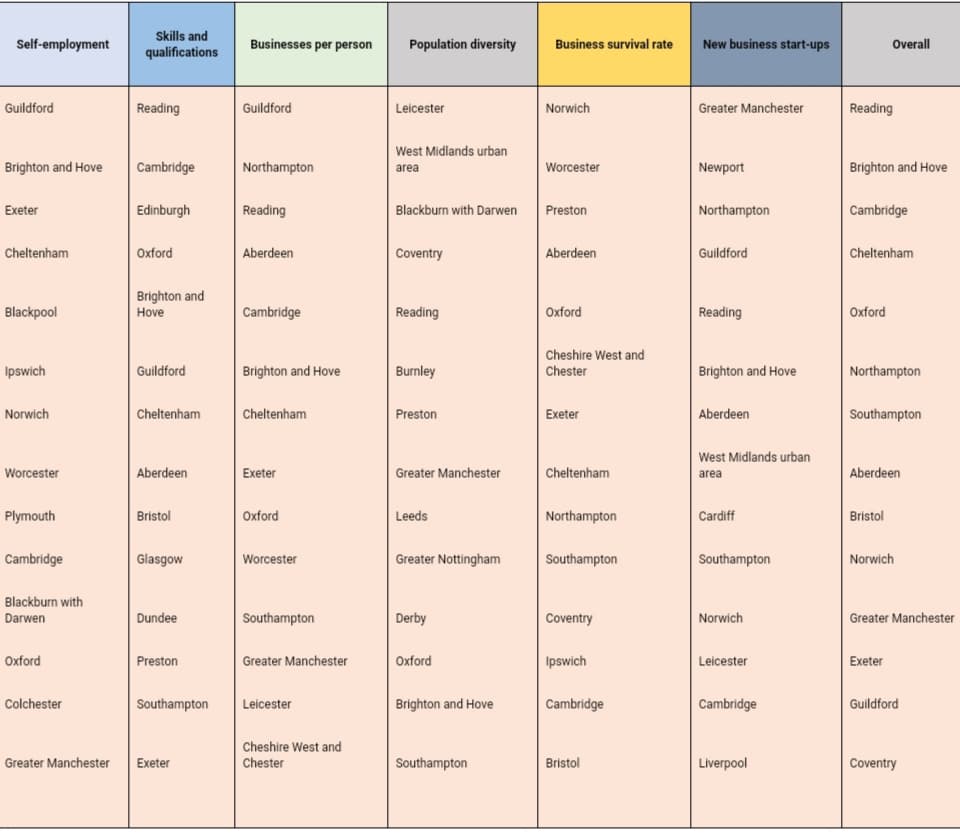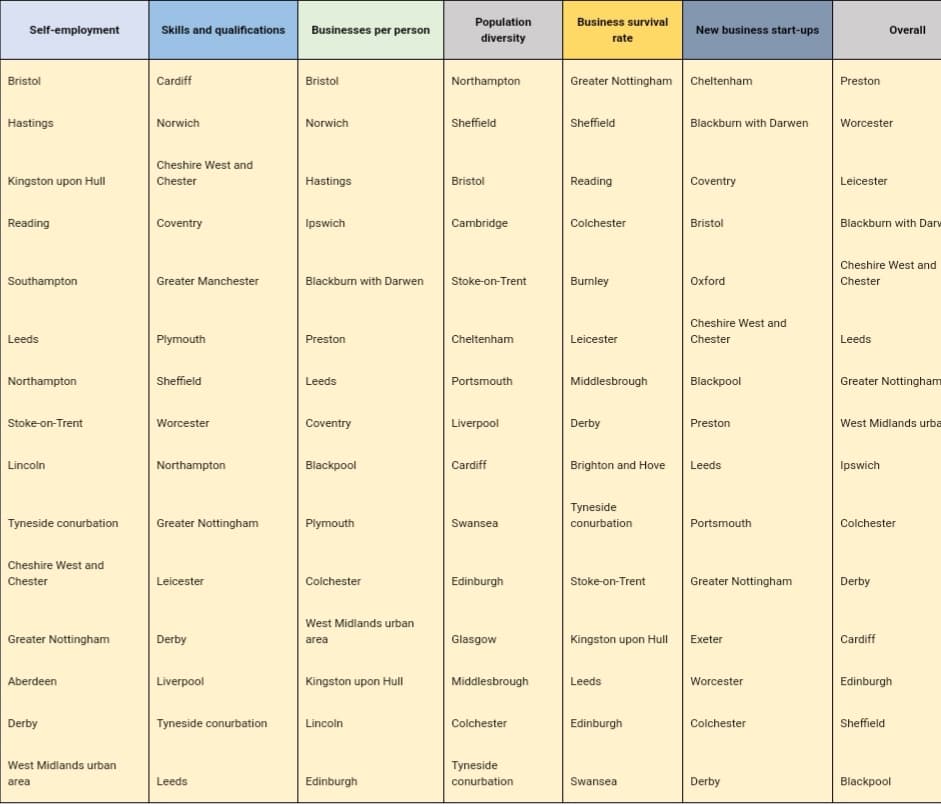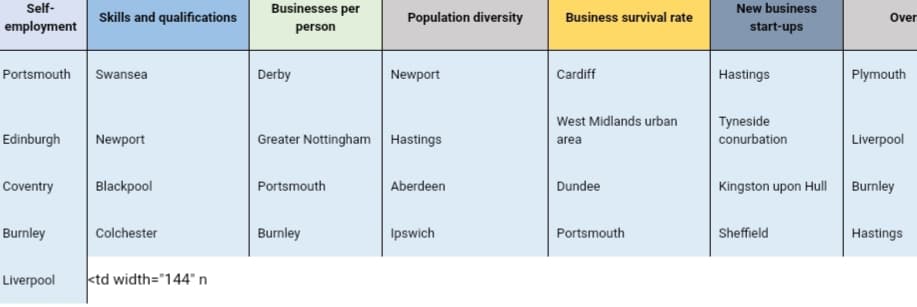New report says more effective use of digital technology by start-up and scale-ups could boost the British economy by as much as £34 billion
London, 3 January 2020 – Reading has all the ingredients to become the best place to start and grow a business according to a new report which, for the first time, assesses the entrepreneurial potential of towns and cities across Great Britain.
The Berkshire town tops the list of ‘entrepreneurial spearheads’ compiled by a former Bank of England economist for Atos, a global leader in digital transformation. The Great British Enterprise reportmarks the launch of Atos’ new ‘Digital Society’ campaign, exploring themes that matter to all of us such as innovation, skills and sustainability, and setting out how technology can be the driving force for positive social change.
The research estimates that the British economy would benefit to the tune of £34bn a year by 2030 if the local economies of towns and cities were to realise their full entrepreneurial potential over the next decade. The report also finds that:
- Local economies that have most unrealised potential are the ones that could benefit most from digital adoption.
- Entrepreneurial and enterprising outcomes can vary significantly within a town or city’s local economy, as well as between the local economies of different towns and cities
The analysis looked at how the local economies of 43 towns and cities across Great Britain perform on six indicators that influence the success of entrepreneurship and enterprise (such as skills levels and diversity) and on measures that represent positive entrepreneurial and enterprising outcomes (such as business survival rates).
The top 5 places with the most entrepreneurial potential are:
1. Reading
- Brighton & Hove
- Cambridge
- Cheltenham
- Oxford
Amongst those areas with bags of potential and that can make the biggest leaps forward are Liverpool and Newport, both of which feature in the lower grouping overall but were in the top tier for new business start-ups.
Reading came in the top five places in Great Britain for four of the six indicators including:
- Over 50% of the population are highly skilled with a NVQ level 4 qualification or higher (equivalent qualification between A-level and undergraduate degree)
- It has a high rate of start-ups and existing businesses including 11,000 digital and technology firms covering a range of sectors including Artificial Intelligence and Fintech
- An ethnically diverse location, with the World Economic Forum highlighting that greater population diversity has a positive effect on entrepreneurship
| Case study: Alex McWilliam, an actor and teacher from Reading, started a B2B business teaching employability skills through improvisation. Alex benefitted from the Thames Valley Business Growth Hub’s programme of support which helped to develop his digital skills. He also had one-to-one sessions with a business adviser, who helped him with setting up his business, from ensuring he had the right kind of insurance to helping him develop his business plan. |
While the local economies of towns and cities have unique attributes and challenges that create the environment for enterprise to happen, digital technology is critical to unleashing the full entrepreneurial potential of the SMEs, start-ups and scale-ups in our towns and cities.
In order to increase business survival rates and truly fulfil Great Britain’s entrepreneurial potential, the report states that towns need to boost support for those who want to start up a business, those that already run small businesses and also those who choose not to due to perceived barriers.
Better use of digital technology can help entrepreneurs in all industries because while not every start-up business is in the tech sector, every start-up needs to embrace digital technology in order to compete. More needs to be done to encourage the adoption and use of digital technology and this report points to a number of policies which could be taken forward by policymakers including:
- Recalibrate local business support on improving digital capability. For example, ensuring Local Enterprise Partnerships can help start-ups to maintain and grow their web presence, make better use of cloud computing and digitise back office functions such as payroll.
- Creating Digital Enterprise Zones, areas within towns or cities which could be testbeds for the early adoption of future digital technology such as 5G mobile networks and full-fibre broadband, to help provide increased speed and capacity for start-ups and scale-ups.
- Implementing Enterprise Accounts, a digital platform – similar to the Pensions Dashboard – which would provide one place for would-be entrepreneurs to access to understand how to start-up and grow a business. The Enterprise Account would contain locally tailored advice on where to find mentors, financing options and accountancy and legal advice as well as to understand tax implications of setting up a business.
Adrian Gregory, Group SEVP, CEO UK&I and Global Head of Atos Syntel, said: “We should be proud that the UK is a dynamic entrepreneurial nation, but we can always do more to help the whole country fulfil its entrepreneurial potential.

“Embracing digital technology and helping businesses use it more effectively is key. If we can do that, then Great Britain could benefit from a £34 billion boost to the economy, as well as helping the whole country fulfil its entrepreneurial potential.”
Cllr Jason Brock, Leader of Reading Borough Council, said: “Many global businesses have chosen Reading to set up their UK headquarters, but it is also essential that new home-grown businesses are encouraged to develop and thrive. We have a highly skilled workforce and a diverse, ambitious population – the essential elements for a successful enterprise, whatever its scale.
“It is vital that local authorities like ours work with the business community to help create the best possible environment for small businesses to grow and to enable enterprising people of all backgrounds to be able to recognise their potential.”

TechUK CEO, Julian David, said: “The UK has a bright digital future. In an age when technology powers everything, we can use the power of technology to shape a better society, economy and planet. This report provides greater evidence as to why we must speed up the process of digitisation.

“Technology will be at the heart of how the UK tackles many of the most pressing challenges facing the country at this current time. This report rightly highlights how embedding digital into the UK’s entrepreneurial culture will supercharge our SME’s to tackle these challenges and further unleash the potential of the UK’s digital economy.”





